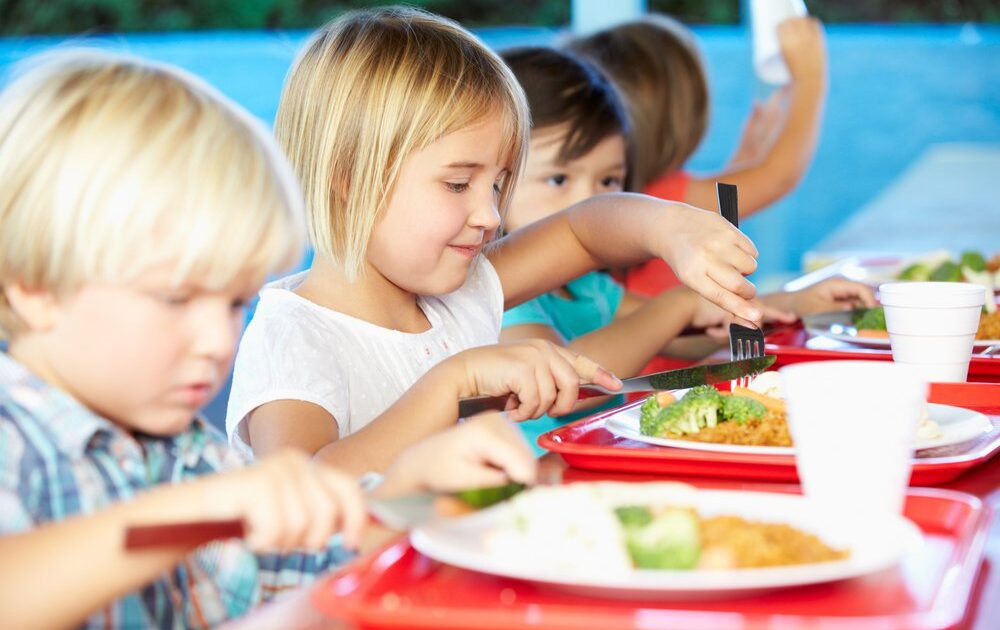V is for ‘Vegan’: Plant-Based School Lunches on the Rise

School lunches have come a long way in recent years.

With obesity rates on the rise, particularly among children, pressures from First Lady Michelle Obama and the USDA have increased the amount of fresh fruits and vegetables, whole grains, and leaner meats in school lunches, while also reducing the amount of added sodium, sugar, and artificial ingredients.
“Why anyone would be opposed to giving healthy food to kids in schools is beyond me,” Marion Nestle, author and professor of nutrition and food studies at New York University, recently wrote on her blog. She points to several studies that show school lunches are healthier than ever, and kids who are eating the meals provided by the schools are less likely to be obese than kids who eat at home or bring their own meals.
For some schools, though, cleaner ingredients are just the tip of the marinated kale salad. The latest trend in school lunches? Vegan food.
Interest in plant-based foods is at an all-time high, according to Lux Research, a strategic advisory firm for emerging technologies, “by 2054, meat alternatives will comprise 33 percent of the overall protein market.”
The Netherlands Government also recently recommended no more than two servings of meat per week.
“After measuring the ecological impact of the average Dutch person’s diet, [the Netherlands Nutrition Center] concluded that eating less meat is better for people’s health and the environment,” wrote Bruce Friedrich on the Good Food Institute’s blog.
More than 50 school districts across the country, including Los Angeles, San Diego, Philadelphia, Boston, and Detroit, have begun observing Meatless Mondays, the popular diet that promises improved personal health and a healthier planet if more people give up meat just one day per week.
Southern California’s MUSE School (founded by director James Cameron’s wife Suzy Amis Cameron) made the transition to an entirely vegan campus last year. Cameron and her husband are committed vegans, so the school’s menus were a natural extension of their commitment.
“The way we eat is the easiest and most impactful way we can alter our carbon footprint as a school,” MUSE’s head of school Jeff King said in a statement. “The largest consumers of water are not people but cattle. To truly deliver our mission of sustainability, we had to find a sustainable way of eating.”
Last month, the Wall Street Journal reported on the Scandinavian School of Jersey City, just across the Hudson River from Manhattan, one of just a few vegan preschools in the U.S.
The Scandi School, as it’s called, came to be an entirely vegan school not because it believes it’s a healthier diet for its students, or because it’s better for the planet. The decision was much more personal than that. School director Maria Germerud-Sharp said she made the decision when two vegan children were enrolled into the program.
“One of the core values of the school is building community,” she told the Journal. “We all eat together.”
Vegan food, while often the butt of many jokes (anyone who’s ever sat at a Thanksgiving table with their first Tofurky knows this), is actually the easiest middle ground. Dairy, eggs, and shellfish are also among the most common food allergens, and many religious diets exclude certain meat products or the mixing of meat and dairy. But where all diets intersect is fruits and vegetables, nuts, beans, grains, and seeds–foods schools have been scrambling to add more of to their menus because they’re also incredibly healthy.
Just this week The Rochester River School, a K through 12 urban school, also announced it’s doing away with cartons of milk at lunch as well as other animal products. Not only will the school be plant-based, but students will also be growing much of the produce on site.
“During the growing season, there would be a huge garden for vegetables and during the winter, the vegetables would be grown in greenhouses, or by a hydroponic system using water,” reports News 10 WHEC, Rochester’s NBC affiliate station. “The idea is for the students to learn how to be self-sustainable and have real-world skills when they graduate.”
Vegan is even trending in Italy—home to decadent cheeses and meats. The Nature school in Milan is the nation’s first vegan kindergarten. And its reasons for giving up animal products aren’t entirely health or environmentally-fueled.
“We love and respect all animals,” school officials told Italy’s La Stampa Chronicles, “so we do not use any food originated from their exploitation.”
Find Jill on Twitter and Instagram
Related on Organic Authority
4 Vegan Breakfast Recipes to Get Meatless Monday Off on the Right Foot
For Vegans ‘Feel the Bern’ Means Protesting Bernie Sanders Rallies (and Still Voting for Him)
Vegan Food Brands Finally Get Their Own Lobby Group in Washington
School lunch image via Shutterstock

